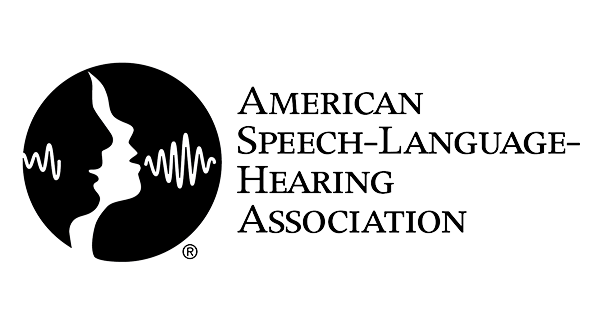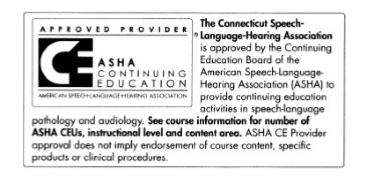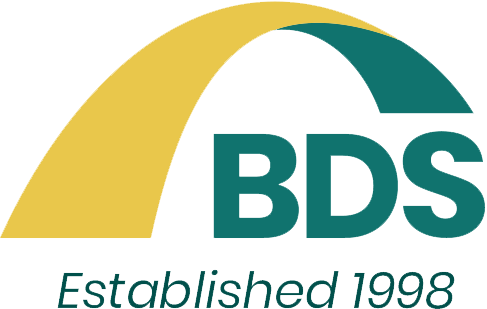Successful participation in both Part 1 and Part 2 webinars awards eligible attendees with 3 BACB Type 2 CE credits, respectively. A TOTAL OF 6 BACB CE CREDITS & 0.6 ASHA CE CREDITS CAN BE EARNED IF BOTH WEBINARS ARE ATTENDED! THESE ARE NOT DUPLICATE WEBINARS. CE CREDITS FOR PSYCHOLOGISTS AND SLPs ARE ALSO AVAILABLE. PLEASE READ THIS PRODUCT PAGE FOR MORE INFORMATION.
Although this Continuing Education webinar workshop is recommended for BCBAs, BCaBAs, Psychologists, and SLPs, only BACB and/or PSYCH and/or ASHA CE credit is awarded (continuing Education credits for Psychologists and SLPs is awarded for an additional fee). However, we can provide verification of attendance for any attendee who meets our attendance criterion, which you may be able to use to receive credit within your particular discipline(s); however, BDS makes no claims with respect to disciplines/credentials beyond BCBA, BCaBA, SLP, and Psychology. See the "How It Works" section (below) for more details.
PLEASE READ THIS ENTIRE PRODUCT PAGE CAREFULLY. THEN, PLEASE CAREFULLY SELECT THE APPROPRIATE PRODUCT VARIANT(S) LOCATED AT THE BOTTOM OF THIS PAGE, BASED ON YOUR PLAN TO ATTEND PART 1, OR PART 2, OR BOTH PART 1 AND PART 2, AND BASED ON WHETHER YOU WANT CE CREDITS (OR NOT).
BITES®: A Behavioral InTEgrated with Speech Approach to Feeding Therapy
Overall Description for Both Webinars:
Pediatric feeding problems are complex and often require a multi-disciplinary approach to assessment and treatment. The Behavioral InTEgrated with Speech approach, known as BITES®, focuses specifically on how Board Certified Behavior Analysts (BCBAs) and speech-language pathologists (SLPS) can work together to assess feeding problems and develop interventions for them. To learn more about BITES®, please visit their website: https://bitesfeedingtherapy.com
With over 30 years of combined experience in the field of pediatric feeding disorders, Dr. Laura Seiverling, Psychologist and BCBA-D, and Elise Jusko, CCC-SLP, will draw from their own experiences working on a multidisciplinary feeding team together and will provide an overview of how cross-discipline collaboration between SLPs and BCBAs can look when it comes to both assessment and treatment of various pediatric feeding disorders.
Oct. 25th | Part 1 Description:
This 3-hour CE workshop will teach participants how to describe typical feeding development, identify the role of various disciplines involved in multidisciplinary feeding evaluations, identify common medical and environmental factors that may lead to a feeding problem, and learn the role of both SLPs and BCBAs in assessment and treatment of pediatric feeding disorders. In addition, the presenters will provide an overview of typical feeding development.
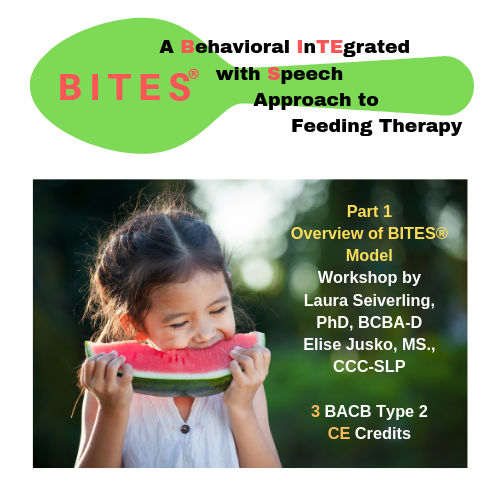
Oct. 25th | Part 1 Learning Objectives:
- Participants will be able to describe typical feeding development.
- Participants will be able to identify the role of various disciplines involved in multidisciplinary feeding evaluations.
- Participants will be able to identify common medical and environmental factors that may lead to a feeding problem.
- Participants will learn the role of both SLPs and BCBAs in assessment and treatment of pediatric feeding disorders.
- Participants will learn how to collect baseline data and determine a starting point for feeding interventions. They will also learn how to collect data on various mealtime behaviors, graph child mealtime behavior, and how to write task-analyzed feeding protocols.
- Participants will learn how to use behavioral skills training to train caregivers to implement feeding interventions.
References for Oct. 25th, Part 1 Webinar:
- Lukens, C. T., & Silverman, A. H. (2014). Systematic review of psychological interventions for pediatric feeding problems. Journal of Pediatric Psychology, 39, 903-917.
- Seiverling, L., Hendy, H. M., & Yusupova, S. (2017). Improvements in child behavior and family mealtime environment after an intensive behavioral feeding intervention. Behavior Modification, 4, 163-175.
- Sharp, W. G., Volkert, V. M., Scahill, L., McCracken, C. E., & McElhanon, B. (2017). A systematic review and meta-analysis of intensive multidisciplinary intervention for pediatric feeding disorders: How standard is the standard of care? The Journal of Pediatrics, 181, 116-124.
~~~
Nov. 1st | Part 2 Description:
This 3-hour CE workshop will teach participants how SLPs and BCBAs can work together to assess and treat both oral motor skill deficits and inappropriate mealtime behavior across a range of pediatric feeding disorders. Interventions for the following problems will be described: food selectivity, packing, chewing, liquid avoidance, choking phobias, rapid eating, dysphagia, tongue thrusts, self-feeding, and tube weaning. Case studies for each feeding problem will be provided along with specific examples of how SLPs and BCBAs can collaborate to develop individualized interventions to address both skill deficits and inappropriate mealtime behavior exhibited by those with feeding problems.
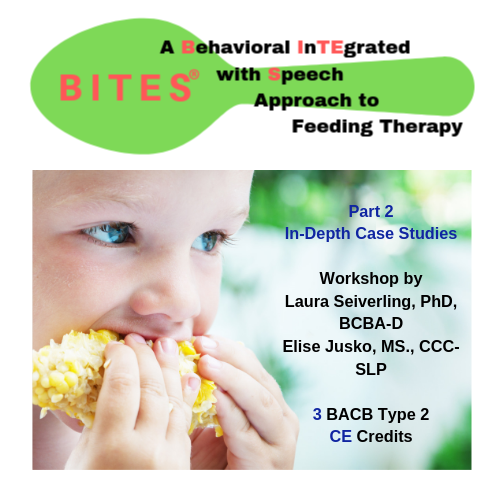
Nov. 1st | Part 2 Learning Objectives
- Participants will learn how to take a number of factors into account when developing a behavioral feeding intervention. These factors include considering the client’s oral motor skills, medical status, pre-treatment diet variety, the severity of the client’s inappropriate mealtime behavior.
- Participants will learn how to develop food selectivity interventions with and without the use of escape extinction.
- Participants will be able to list the specific skills often needed to be taught when teaching a client to how to chew.
- Participants will be able to identify the interventions used to address packing (i.e., holding food in the mouth for protracted durations) related to avoidance/refusal behavior and packing related to inadequate oral motor skills.
- Participants will learn how various types of prompting procedures (i.e., least-to-most, most-to-least, and graduated guidance) can be implemented in a self-feeding intervention.
- Participants will learn how SLPs and BCBAs can work together to prepare a client for an instrumental swallow evaluation.
References for Nov 1st, Part 2 Webinar:
- Dovey, T. M., Wilken, M., Martin, C. I., & Meyer, C. (2017). Definitions and clinical guidance on the enteral dependence component of the avoidant/restrictive food intake disorder diagnostic criteria in children. Journal of Parenteral and Enteral nutrition, 42, 499-507.
- Gibbons, B. G., Williams, K. E., & Riegel, K. E. (2007). Reducing tube feeds and tongue thrust: Combining an oral-motor and behavioral approach to feeding. American Journal of Occupational Therapy, 61, 384-391.
- Manno, C. J., Fox, C., Eicher, P. S., & Kerwin, M. E. (2005). Early oral-motor interventions for pediatric feeding problems: What, when, and how. Journal of Early and Intensive Behavior Intervention, 2, 145-159.
- Volkert, V. M., Peterson, K. M., Zeleny, J. R., & Piazza, C. C. (2014). A clinical protocol to increase chewing and assess mastication in children with feeding disorders. Behavior Modification, 38, 705-729.
~~~
How it works:
- Purchase access via this product page. You can purchase the webinar-only or the webinar + CE credit option for either of the two webinars (BCBAs and BCaBAs are recommended to purchase the CE credit option). You can also purchase the PSYCH and/or ASHA CE upgrade for an additional fee. You must purchase 1 upgrade PER WEBINAR if you are a Psychologist and/or SLP and wish to earn the maximum CE credits available.
- Shortly before the webinar, you will receive an email from BDS with a special link. You must use this link to pre-register for the webinar. IF YOU DO NOT pre-REGISTER, YOUR SIGN-IN TO THE EVENT MAY BE DELAYED AND YOU MAY NOT BE ELIGIBLE FOR CE CREDIT! PLEASE CAREFULLY READ ANY EMAILS FROM BDS AFTER PURCHASE IN THE DAYS LEADING UP TO THE EVENT IN ORDER TO REGISTER IN TIME!
- After registering, you will receive an email from GoToWebinar with the link you must use to actually attend the live webinar! NOTE: PURCHASING DOES NOT EQUAL REGISTERING. REGISTRATION WILL OCCUR AT SOME POINT AFTER PURCHASE.
- These are LIVE Webinars! This means you must be able to attend during the exact day and time noted in this product description. PLEASE MAKE NOTE OF THE TIMEZONE (EDT). (THESE WEBINARS WILL NOT BE MADE AVAILABLE AS RECORDINGS AFTERWARDS.)
- You will also need a reliable internet connection.
- To test your device for compatibilty prior to the day of the event, please use this GoToWebinar test link: https://support.logmeininc.com/gotowebinar/system-check-attendee
- Your attendence will be verified during the webinar via "poll" questions that will be asked at random intervals. If you do not respond to a sufficient number of these questions, you will not earn CE credit for attending; therefore, it is critical that you sign in to the webinar on-time AND remain present at your device during the entire webinar. (The "poll" questions are not "test" questions and therefore are not designed to assess your knowledge; their purpose is to confirm that you are physically attending and actively attentive to the event.)
- Once the webinar has ended and after your attendance has been confirmed by BDS staff, you will be given access to a survey module on our learning platform (you will receive an email with instructions on accessing the survey module). If you did not sign in on time, or if you logged off early, or if you did not respond to sufficient poll questions, you will not be invited to take the survey and earn CE credit due to failure to meet our attendence criterion.
- Once you complete the survey module, your CE certificate will automatically be generated!
- NOTE: Those who purchased the Continuing Education credits for Psychology must complete a post-test module achieving a score of no less than 80% within three attempts. Those who purchased ASHA Continuing Education credits will be required to fill out an additional form demonstrating their learning, as well as a Participant Form. Please read the disclaimer at the bottom of this page regarding our 3rd-party Psychology and ASHA CE credit providers.
These LIVE webinars will both be held on Fridays -- Oct. 25th and Nov. 1st -- from 11:00am to 2:00pm Eastern Time on both days. You must be available at the specific date and time in order to attend and to be able to meet our attendance requirements. This event will NOT be provided afterwards as a recording! Your CE certificate will be generated upon completion of the webinar, pending your attendance is verified, and you complete a brief survey module.
DISCOUNTED GROUP RATES ARE AVAILABLE:
Agencies or groups who purchase seats of 10 or more get 15% off per seat! Please contact support@behaviordevelopmentsolutions.com PRIOR TO PURCHASE for details!
~~~
Mandatory Disclaimer:
The Behavior Analyst Certification Board® does not warrant, endorse, sponsor, approve or partner with the CE events, this organization, or instructors. (Note that the above disclaimer does not mean that the BACB disapproves these products. They simply don't endorse any CE products or events and they want you to know this. However, they do approve providers and BDS is an Approved CE Provider. Therefore, you can rest assured that your CE credits will be accepted by the BACB.)
To manage your CE credits on the BACB web site, you will need our ACE Provider number: OP-02-0017.
BDS is an authorized Type II continuing education provider.
Notice for non BCBA/BCaBA attendees:
Although BDS can provide proof of attendance to those who meet our attendance criterion, BDS makes no claims and takes no position with regard to how said attendance verification is utilized, particularly with regard to other disciplines/certifications/licenses. If you use proof of attendance toward SLP CE credit (or any form of continuing education "credits," "hours," or similar), BDS will not be held responsible for any outcome you may encounter. It is your responsibility to ensure that webinars and workshops that you attend will be considered appropriate and qualifying for your respective disciplines unique continuing education (or analagous) standards.
With regard to Continuing Education for Psychologists:
After purchasing a seat to Part 1 and or Part 2 of the BITES webinar, click this link (https://www.behaviordevelopmentsolutions.com/bites-psych-ce-upgrade) to purchase the PSYCH CE upgrade. You must purchase 1 upgrade PER WEBINAR. If you attend both, you must purchase 2 PSYCH CE Upgrades in order to earn the full 6 PSYCH CE credits.
Orlando Behavior Health, LLC is approved by the American Psychological Association to sponsor continuing education for psychologists. OBH, LLC maintains responsibility for this program and its contents. If Psychology credits were purchased, please email your Psychology license number, the state in which you are licensed, a copy of your course completion report, and a copy of your attendance verification sheet to bbeaupre@behaviordevelopmentsolutions.com. Please contact joel@behaviordevelopmentsolutions.com to receive a copy of your attendance verification sheet. You can generate your course completion report by clicking the "reports" menu when you are logged into the Behavior Development Solutions learning platform. Orlando Behavior Health Services, LLC will be notified and you will be emailed a psychology certificate.
With regard to Continuing Education for SLPs:
BDS is able to award ASHA CEs for SLPs through a cooperative sponsorship program made possible by UCONN's Department of Speech, Language, and Hearing Sciences https://uconn.edu. If you have questions for the sponsor, please reach them via this contact page: https://slhs.uconn.edu/nicole-gallagher-m-s/# Their CE Provider code is AAHG.

